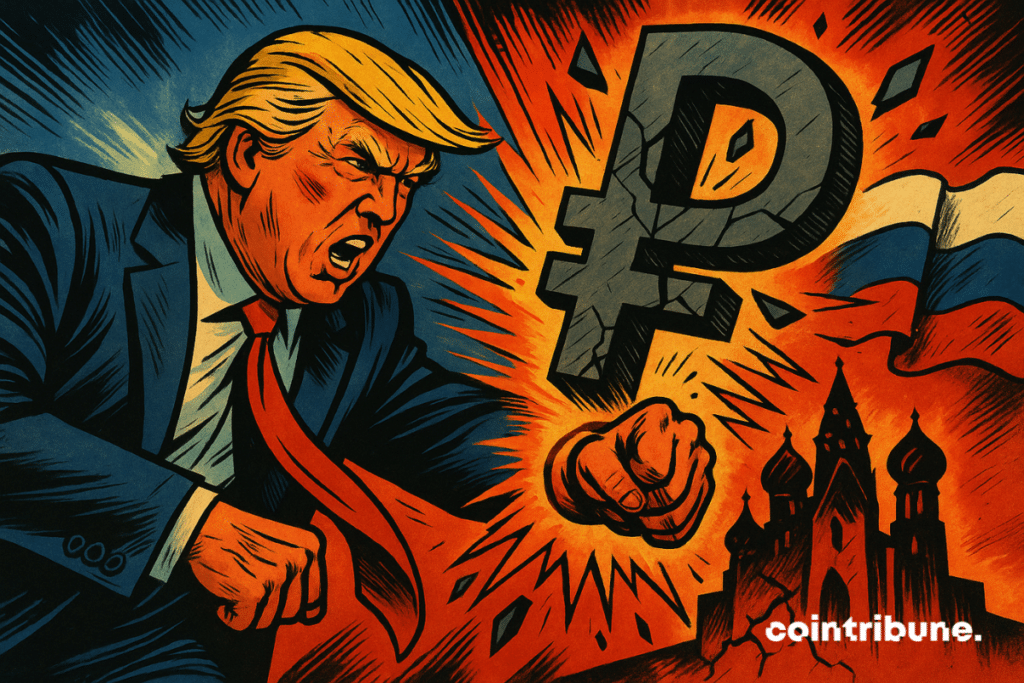Russia’s Economy Under Strain As Sanctions Intensify
For the first time since the start of the conflict in Ukraine, Washington and Brussels are coordinating a series of major economic sanctions against Russia. Directly targeting the energy sector, these measures aim at Rosneft, Lukoil and gas exports. The objective is to dry up the revenues that fuel the Kremlin’s war effort. This financial offensive marks a strategic turning point, with immediate consequences on the markets and expected repercussions on the Russian economy, already weakened by three years of international pressure.

In brief
- The United States and the European Union are coordinating a new wave of major economic sanctions against Russia.
- Rosneft, Lukoil and Russian gas exports are directly targeted, with measures also affecting ships and intermediary companies.
- The sanctions caused an immediate reaction in the markets, with Brent rising 5 % and tensions on global energy supply.
- In response, Moscow displays a defiant posture, but economic indicators reveal increasing fragility of the Russian economy.
Targeted sanctions
While the EU pointed at crypto platforms in its latest sanctions package, Donald Trump imposed new economic sanctions on Russia in a major strategic decision, directly targeting Rosneft and Lukoil, two giants of the country’s oil industry. This action follows the Kremlin’s rejection of a call for a ceasefire and peace negotiations.
Helima Croft, head of commodities strategy at RBC Capital Markets, described this decision as “the most decisive measure taken by the United States to cut off the Russian war tap”.
The impact was immediately felt on the markets. Indeed, the price of Brent surged by about 5%, reflecting fears of a global supply imbalance. These sanctions directly target Russia’s energy revenues, which represent about one-third of its federal budget.
In a coordinated move, the European Union has increased the pressure by adopting several key measures, marking a rare transatlantic synergy :
- The gradual halt of European purchases of Russian liquefied natural gas, estimated at 8.1 billion dollars ;
- The blacklisting of 21 foreign companies, mainly Chinese, accused of helping Russia to circumvent sanctions ;
- The addition of 117 ghost ships illegally transporting Russian oil to the list of 558 already banned ;
- Strengthened controls on financial flows related to oil trade, with European representatives present in Washington at the American announcement.
European diplomats stated that, if both blocs rigorously apply these measures, the consequences for Russia could be “multiplicative”. This new financial offensive marks an escalation in the strategy of economic containment towards Moscow, with a stated will to close down parallel financing channels of the war.
An economy under pressure
Faced with this offensive, Russian authorities have a firm stance but tinged with concern. Maria Zakharova, spokesperson for the Ministry of Foreign Affairs, declared that the sanctions “will not pose a problem” and that Russia has built “strong immunity against Western restrictions”.
Dmitry Medvedev, Vice Chairman of the Security Council, accused the United States of having “completely chosen the path of war against Russia”. However, the figures reveal a different situation. Russian growth, after reaching 4.3 % in 2024, is now projected at only 0.6 % in 2025 and 1 % in 2026, according to the latest IMF forecasts. Inflation remains high, near 8 %, while the central bank maintains prohibitive interest rates at 17 %.
Signs of internal tensions are numerous. The Kremlin draws from its National Reserve Fund, multiplies domestic bond issues and raises taxes, provoking anger among small businesses. The association Opora, representing Russian SMEs, described new tax increases as a “shock for all small businesses”.
Manufacturing industries, ranging from tractor production to furniture making, are beginning to reduce their activity. Despite some agility in hiding exports through parallel fleets and diverted sales to China and India, two influential members of the BRICS alliance, Russia is unable to fully offset the impact of Western sanctions.
While alternative circuits limit some short-term effects, structural consequences accumulate: progressive deindustrialization, loss of investments, budgetary fragility. The Kremlin’s resilience strategy is reaching its limits in the face of an increasingly synchronized Western coalition. For economic observers as well as geopolitical actors, the coming months promise to be decisive in the evolution of Russia’s position, both militarily and economically.
Maximize your Cointribune experience with our "Read to Earn" program! For every article you read, earn points and access exclusive rewards. Sign up now and start earning benefits.
Diplômé de Sciences Po Toulouse et titulaire d'une certification consultant blockchain délivrée par Alyra, j'ai rejoint l'aventure Cointribune en 2019. Convaincu du potentiel de la blockchain pour transformer de nombreux secteurs de l'économie, j'ai pris l'engagement de sensibiliser et d'informer le grand public sur cet écosystème en constante évolution. Mon objectif est de permettre à chacun de mieux comprendre la blockchain et de saisir les opportunités qu'elle offre. Je m'efforce chaque jour de fournir une analyse objective de l'actualité, de décrypter les tendances du marché, de relayer les dernières innovations technologiques et de mettre en perspective les enjeux économiques et sociétaux de cette révolution en marche.
The views, thoughts, and opinions expressed in this article belong solely to the author, and should not be taken as investment advice. Do your own research before taking any investment decisions.